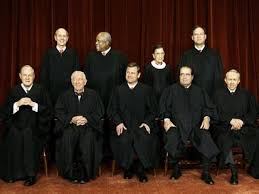 A few minutes ago, the Supreme Court ruled as expected, 5-4 along partisan lines (Kennedy joined by Alito, Roberts, Scalia and Thomas), in favor of white and Hispanic firefighters who filed suit against New Haven, Connecticut. Here is the opinion of the Supreme Court, along with a dissenting opinion by Justice Ginsburg. This case garnered particular attention because of the fact that it overturns a decision backed by Supreme Court nominee Sonia Sotomayor.
A few minutes ago, the Supreme Court ruled as expected, 5-4 along partisan lines (Kennedy joined by Alito, Roberts, Scalia and Thomas), in favor of white and Hispanic firefighters who filed suit against New Haven, Connecticut. Here is the opinion of the Supreme Court, along with a dissenting opinion by Justice Ginsburg. This case garnered particular attention because of the fact that it overturns a decision backed by Supreme Court nominee Sonia Sotomayor.Majority Opinion by Justice Kennedy
...Certain white and Hispanic firefighters who likely would have been promoted based on their good test per-formance sued the City and some of its officials. Theirs is the suit now before us. The suit alleges that, by discarding the test results, the City and the named officials discriminated against the plaintiffs based on their race, inviolation of both Title VII of the Civil Rights Act of 1964, 78 Stat. 253, as amended, 42 U. S. C. §2000e et seq., and the Equal Protection Clause of the Fourteenth Amendment. The City and the officials defended their actions, arguing that if they had certified the results, they could have faced liability under Title VII for adopting a practice that had a disparate impact on the minority firefighters. The District Court granted summary judgment for thedefendants, and the Court of Appeals affirmed.
We conclude that race-based action like the City’s in thiscase is impermissible under Title VII unless the employer can demonstrate a strong basis in evidence that, had it not taken the action, it would have been liable under the disparate-impact statute. The respondents, we further determine, cannot meet that threshold standard. As a result, the City’s action in discarding the tests was a violation of Title VII. In light of our ruling under thestatutes, we need not reach the question whether respondents’ actions may have violated the Equal Protection Clause.
Dissenting Opinion by Justice Ginsburg
The Court today holds that New Haven has not demonstrated “a strong basis in evidence” for its plea. Ante, at 2. In so holding, the Court pretends that “[t]he City rejected the test results solely because the higher scoring candidates were white.” Ante, at 20. That pretension, essential to the Court’s disposition, ignores substantial evidence of multiple flaws in the tests New Haven used. The Court similarly fails to acknowledge the better tests used in other cities, which have yielded less racially skewed outcomes.Let's hope that Justice Ginsburg is correct.
By order of this Court, New Haven, a city in which African-Americans and Hispanics account for nearly 60 percent of the population, must today be served — as it was in the days of undisguised discrimination — by a fire department in which members of racial and ethnic minorities are rarely seen in command positions. In arriving at its order, the Court barely acknowledges the pathmarkingdecision in Griggs v. Duke Power Co., 401 U. S. 424 (1971), which explained the centrality of the disparate-impact concept to effective enforcement of Title VII. The Court’s order and opinion, I anticipate, will not have staying power.

